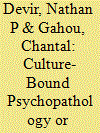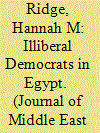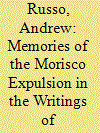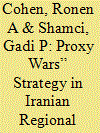|
|
|
Sort Order |
|
|
|
Items / Page
|
|
|
|
|
|
|
| Srl | Item |
| 1 |
ID:
188443


|
|
|
|
|
| Summary/Abstract |
Certain aspects of Vodoun, Benin’s primary indigenous religious tradition, have been perceived by some of that nation’s Christian believers as a menacing occult reality. Many Christians report states of acute psychological distress due to fears of the forces of Vodoun. This study analyzes the strategies employed by applied psychotherapeutic science professionals to diagnose and treat such cases, with an eye toward presenting a framework for the possible amelioration of clinical outcomes in comparable instances elsewhere.
|
|
|
|
|
|
|
|
|
|
|
|
|
|
|
|
| 2 |
ID:
188439


|
|
|
|
|
| Summary/Abstract |
Despite years of high expressed support for democracy in the Middle East, recent social movements have not resulted in durable democratization. Egypt, in particular, experienced an authoritarian reversion under a military coup. This article addresses Egyptians’ support for democracy in the context of Democratic Culture Theory. Using an original survey in Egypt and machine learning, it finds that support for liberal values and support for elected government function independently in Egypt. A large minority of the survey respondents were liberal democrats, but the Egyptian public also includes sizable blocs of illiberal democrats and liberal non-democrats. These results suggest that, although there is real support for democracy in Egypt, there is less commitment to the values that can sustain democracy.
|
|
|
|
|
|
|
|
|
|
|
|
|
|
|
|
| 3 |
ID:
188442


|
|
|
|
|
| Summary/Abstract |
The Morisco expulsion of 1609–1614, enacted during the reign of Philip III, left tens of thousands deserted in foreign lands and uncertain of their futures. The vast majority of those expelled ended up in Tūnis. There a small circle of educated and respected leaders among the Moriscos sought to integrate their fellows into Maghribī life through the cultivation of friendships with prestigious leaders in Tūnis and by producing writings that were meant not only to demonstrate the dignity and nobility of the Moriscos but also to show their coherence as a distinctive people with a common origin that is rooted in the history of al-Andalus. To that end, Muḥammad Ibn ʿAbd al-Rafīʿ, an émigré from Murcia, composed Al-Anwār al-Nabawiyya fī Abā Khayr al-Barriyya (“The Prophetic Lights on the Fathers in the Best Land”), a manuscript that was meant to meet concerns over the Morisco presence in the Maghrib by invoking memories of al-Andalus and Granada. The analytic tools of memory studies thus allow one to see the extent to which memories of al-Andalus were creatively conceptualized and employed to create space for the Moriscos within Andalusī history and Maghribī society.
|
|
|
|
|
|
|
|
|
|
|
|
|
|
|
|
| 4 |
ID:
188441


|
|
|
|
|
| Summary/Abstract |
This article examines frontline officers’ experiences with community policing and how these experiences shape their attitudes toward different security actors engaged in counterterror activities in a region experiencing protracted conflict (i.e., Kismaayo, Somalia). Relying on path dependency theory and an original and new dataset, the current study finds that officers with experience with the organizational adaptation dimension of community policing are less likely to believe that militarized forces with offensive functions are suited to respond to terrorism, while experience with the community engagement dimension makes officers less likely to believe an armed intelligence force with an informant cultivation mandate is suited for countering terrorism. These findings expand the scholarly understanding of community policing and counterterrorism by focusing on officers’ actual experiences with different dimensions of community policing and how these experiences shape frontline officers’ attitudes in a region dealing with prolonged warfare, an active terrorist threat, and a plurality of forces.
|
|
|
|
|
|
|
|
|
|
|
|
|
|
|
|
| 5 |
ID:
188440


|
|
|
|
|
| Summary/Abstract |
The Islamic Republic of Iran’s efforts to export its revolution in the Middle East is quite old news. The largest regional conventional war in recent history was the Iran-Iraq War (1980–1988), which not only sharpened the historical enmities and hostilities between Arab-Sunnis and Persian-Shiʿi but also revealed Iran’s new foreign policy activism among the other Shiʿi communities in the Middle East – but not only them. This article argues that, after having failed to establish a pro-Iranian government in Iraq, Iran’s regional foreign policy, especially in the matters of managing its proxies and allies in its efforts to build a functional territorial corridor between Iran and Lebanon via Iraq and Syria, views the Syrian geographical region as the last important fortress it needs to complete this strategy. Even though Iran’s economic problems are acute because of decades of sanctions and isolation, Iran still invests billions of dollars in order to safeguard this bastion. The central argument of this work is that the tactical success that the proxies are presently providing for Iran and Syria has been limited to the very specific goal of preserving the Syrian regime since this is what has been enabling Iran to expand its regional stronghold. In terms of this being an effective long-term strategy, however, and despite Iran’s insistence that a proxy war is necessary, such a war benefits its rivals as well. This is because the strategy leads to Iran isolating itself even more in the region and to a loss of its territories of influence.
|
|
|
|
|
|
|
|
|
|
|
|
|
|
|
|
|
|
|
|
|